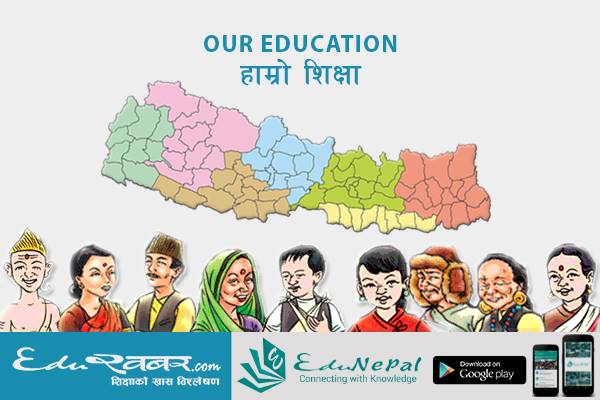
Kathmandu- The quality of education will not improve until the political commitment towards public education translates into action. Political leaders should not ignore their commitments made during elections. Their lack of interest for increasing the education budget to 20 percent of the total annual financial estimates shows that they are not only dishonest but also not serious towards delivering the agenda of sustainable development. With the handover of the secondary education related activities to the local bodies, the newly elected local governments should be more dynamic and accountable towards finding out the resources and mobilisation of the funds.
Prof. Kedar Bhakta Mathema is worried about the declining trend of allocation for education in the recent annual budgets. He says he is surprised that the political parties, their leaders and members of the parliament are not serious.
Prof. Mathema says the quality of education will not improve until the political leadership demonstrates a clear commitment.
'Politicians should not only speak about increasing investment in education during elections. They should work towards turning it into reality.'
He lambasts government and political parties for turning a blind eye on the matter. 'They don't care about investment in education, but arrive at political consensus to pour money for opening new embassies abroad,' he says with disappointment. 'We have embassies in Brazil, South Africa, Canada, different parts of Europe, Austria and we are spending money there. We need to focus on spending for education not on such areas which are less important to general public in Nepal.'
In the fiscal year 2007/08, education budget had the 16.8 percent share of the total annual budget. In 2010/11, it further increased and reached 17.11 percent. But last year, it drastically fell down to 11.06 percent and now it has come down to just 10 percent of the total budget.
The deduction in budget contradicts with commitment made by Nepali officials at international forums. They have been promising that the educational budget would make up 20 percent of the total annual financial estimates. Many experts like Prof. Mathema believe that decline of investment in education is a serious blow to securing sustainable development in the country. They argue that it would create a long term loss for the country.
Prof. Mathema suggests that the local governments should be more responsible and accountable for resource and investment mobilization for improving the quality of secondary education. With the conduction of local elections, political parties now have major role for bringing policies to facilitate the implementation of the rights entrusted to local bodies.
Former Education Minister Gangalal Tuladhar, who also heads the education department of the CPN-UML party, says they are serious about improving the quality of education. 'It is good news that the responsibility of the secondary education is now transferred to local bodies,' he says adding that there are both challenges and opportunities.
'Some of the local bodies may be capable but all of them don't have the necessary resources,' he says. 'Until the local governments find out their own resources or are self dependent, the central government should bear the cost of education,' adds Tuladhar.
He says the local governments should also gradually work towards finding resources required for financing the education. He said they should levy revenues and used the income from it to finance education.
Former Education Minister and Central Committee member of the CPN-Maoist Centre Dhaniram Poudel says the education related programmes being implemented from the central budget should now be given to local bodies. He says new sources of income should be identified, the tax net should be expanded and support from donors should also be used a source of financing the education.
'Unlike the past when central government would fund the schools at the local level, the government should now directly deposit the budget for education in a fund created by the local governments,' he says.
Nepali Congress leader Pradip Paudel, also a former student leader, suggests that there should be further discussion regarding the issue. 'We should be first clear on whether the education is the responsibility of a state or an individual. We are now a federal democratic republic. We had revolutions that changed regimes for the wrong policies they had in the past. We should look into the old context and decide how we want to move forward now.'
He says the local bodies should pay attention to ensure that everyone has an access to education. 'We need to handover only the administrative duties to the local bodies. The central government itself should look after the management of budget. The government should take the responsibility for providing education free of cost to its people.' He also criticized the government for formulating wrong policies in a bid to detach the centre from its role of managing school level education.
Dr. Rajendra KC, the education department chief of the Naya Shakti Party, says the Nepal's rich natural resources should be utilised to fund education. 'We have tremendous natural resources offered to us. If we work in creative ways, we should not go anywhere to search the sources to finance education. We can even build house and schools from local resources. We need to mobilise the local resources efficiently.'
The central committee leader of the Nepal Loktantrik Forum Laba Yadav says Nepal has started a new experiment by handing over the right of secondary education to local bodies. He stressed that the central government should not completely abandon its role while the local governments implement the responsibility.
The local governments are entrusted the responsibility to look into the secondary education in the new constitution based on the political consensus. It may require additional political consensus for implementing the new role, but most importantly it would require additional resources and special attention on the mobilization of resources to achieve the desired outcome.
प्रतिक्रिया